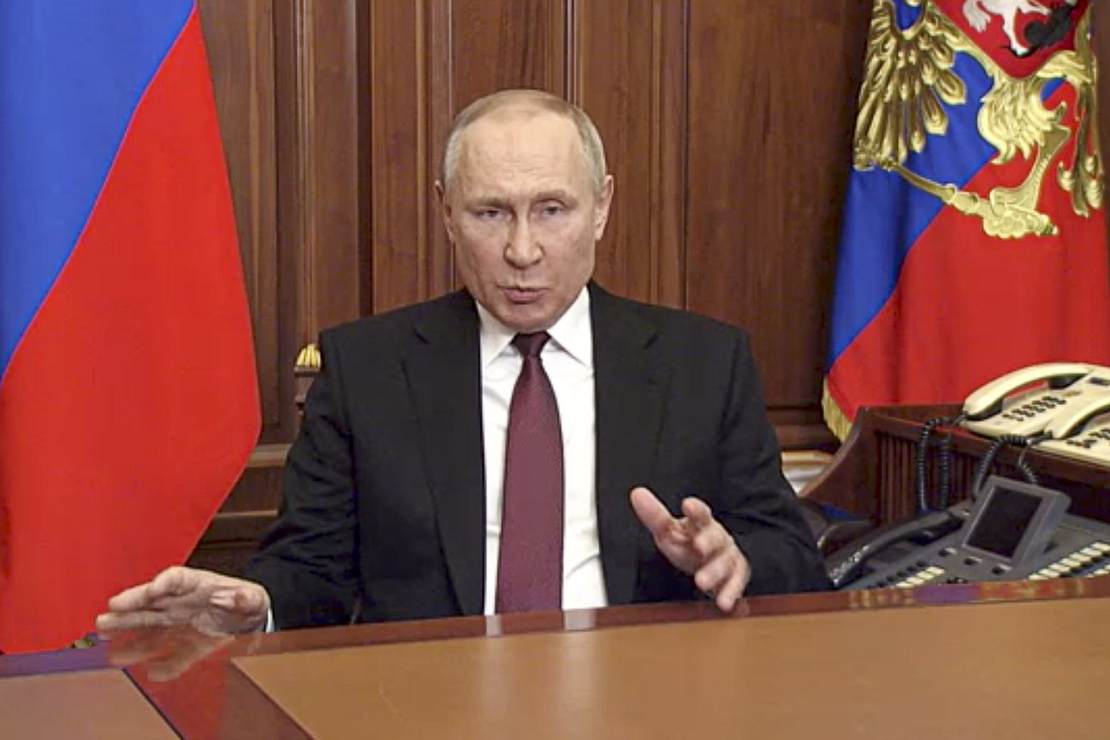
Yesterday’s response revealed more than hypocrisy or even projection from Vladimir Putin — it revealed desperation. After the humiliation of the attack on the Kerch bridge, which Putin personally opened as a symbol of Russian permanence in Ukraine, Putin unleashed cruise missile attacks on cities across Ukraine overnight. Missiles struck as far from the front as Lviv, making it clear that this had no military value but instead was a terror attack on Ukrainians:
Russia fired cruise missiles at cities across Ukraine during rush hour on Monday morning, killing civilians and knocking out power and heat, in what President Vladimir Putin declared to be revenge for Ukrainian attacks including on a bridge to Crimea.
The missiles tore into busy intersections, parks and tourist sites in the centre of downtown Kyiv with an intensity not seen even when Russian forces attempted to capture the capital early in the war.
Explosions were also reported in Lviv, Ternopil and Zhytomyr in western Ukraine, Dnipro and Kremenchuk in central Ukraine, Zaporizhzhia in the south and Kharkiv in the east.
In a televised address, Putin said he had ordered “massive” long-range strikes against Ukrainian energy, command and communication targets, using missiles fired from air, sea and land, in response to what he described as terrorist attacks, including Saturday’s explosion at the Kerch Strait bridge.
Ahem. The Kerch bridge was and still is a legitimate military target, as it is a major line of communication for the Russian military. In fact, that was both its nominal and symbolic purpose when Putin ordered it built. The rail line especially has military value for munitions, fuel, heavy materiel, and personnel. Putin built it not just for an alternative to ferries for civilian traffic but also as a much faster resupply route for Russian military forces in Crimea.
The problem for Putin is that he sold the symbolism of the bridge a little too well. The successful attack on the bridge has made it clear that Putin and his military are falling backward, not moving forward, even if the rushed and incompetent mobilization hadn’t already made that clear to ordinary Russians. Eliot Cohen made this same point at The Atlantic yesterday:
The Kerch Strait Bridge attack, by contrast, inflicted at most a couple of casualties but packed multiple punches. It struck a prime symbol of the project of Russian imperial restoration, an expensive structure designed to link a Crimea reincorporated into Russia with the motherland. It damaged a crucial supply route. It showed that Ukraine could reach deep behind Russian lines to hit, with exquisite precision, a key and extremely well-defended target. It was, above all, a personal as well as a national humiliation: This was Vladimir Putin’s pet construction project, and it was the most unwelcome gift possible on his 70th birthday.
Russia’s military predicament is going from bad to worse. Occupying a thousand-kilometer front and reliant on massed firepower, the Russian military depends on creaking supply lines that run parallel to the front and that are increasingly vulnerable to Ukrainian precision attacks. The one exception—the route through Crimea—just received a dramatic blow….
READ RELATED: Cephas Hour Offers Relief From the Current Madness
Nor will the battlefield stand still. A few more good strikes on the Kerch Strait Bridge and it will become virtually unusable. A tenuous Russian logistical system will come under greater and possibly unsustainable strain during bad weather, which may slow, but will not stop, Ukrainian attacks. A much larger psychological disaster for Russia will ensue if and when Kherson falls and the largest city that Russia has taken is lost to Ukraine, together with thousands of Russian prisoners. That would be the real inflection point, a great battle, and as Churchill also put it: “Great battles, won or lost, change the entire course of events, create new standards of values, new moods, new atmospheres, in armies and in nations, to which all must conform.”
The Kerch bridge attack unleashed dissent and malcontent from what had previously been Putin’s base of nationalists, too. Suddenly, the narrative has shifted in Russia from Putin being a nationalist hero to being too soft to get the job done. ISW spent almost all of its daily assessment overnight on the rapidly shifting political ground in the nationalist movement. At the moment, it threatens to split into factions and perhaps start lifting alternatives to Putin as tsar:
The attack on the Kerch Strait Bridge, coupled with recent Russian military failures and partial mobilization, is generating direct criticism of Russian President Vladimir Putin and the Kremlin from the Russian pro-war nationalist community. Some milbloggers, who represent and speak to that community on Telegram, criticized Putin’s and the Kremlin’s failure to address major events forthrightly, noting that it is challenging to rally behind Putin when his government relies on secrecy.[1] Others noted that Putin has consistently failed to address incidents such as the sinking of the cruiser Moskva or the prisoner exchange of Azovstal fighters whom the Kremlin had consistently demonized since the Battle of Mariupol.[2] Some milbloggers said that Putin must retaliate for the explosion on the Kerch Strait Bridge lest his silence be perceived as ”weakness.”[3] Milbloggers who did not criticize Putin instead criticized Russian Deputy Chairman of the Security Council Dmitry Medvedev’s silence following the explosion after he had made several public claims that an attack on the Crimean Bridge was a Russian “red line.”[4] Direct criticism of Putin from this community is almost unprecedented. Milbloggers and other nationalist figures continue to express overwhelming support for Putin’s goals in Ukraine and have hitherto blamed failures and setbacks on the Russian military command or the Russian Ministry of Defense (MoD).
These critiques from the pro-war camp may indicate rising doubts about Putin’s ability to deliver on his promised goal of “denazifying” Ukraine and may undermine Putin’s appeal within his core constituency. Putin’s stated objectives for the invasion he launched on February 24 deeply resonated with the nationalist community, which firmly subscribes to the ideology of Russia’s historic and cultural superiority and right to control over the territories of the former Soviet Union and the Russian Empire. Recent military failures have caused some milbloggers to become concerned about Putin’s commitment to that ideology, however, with some milbloggers even accusing him of failing to uphold the ideology even prior to the full-scale invasion in February 2022. One milblogger noted on October 7 his disgust with the Russian political elite, including Putin, for consistently failing to seize Ukraine after the Euromaidan Revolution in 2014 and for conducting an “ugly special military operation” that only further united Ukrainians and the West against Russia.[5]
Milbloggers’ dissatisfaction with Putin’s inability to enforce his own “red lines” is rooted in his failure to properly establish information conditions prior to the full-scale invasion of Ukraine. Putin had defined red lines as NATO expansion and the delivery of strategic weapons systems including nuclear-capable systems to Ukraine prior to the invasion but he has not publicly adjusted these “red lines” since the invasion began.[6] Milbloggers have thus latched onto Medvedev’s declared “red lines,” which Putin has not publicly affirmed let alone enforced–facts that have only further disappointed them. The Kremlin has left room for confusion regarding its own vision for the war from the outset, a fact that may threaten its continuing support among people for whom the most extreme and grandiose objectives resonate.
This explains why Putin responded with maximum cruelty and terror. It was a demonstration of both to the nationalists who still believe that Russian cruelty and terror can frighten off the West and make Ukraine surrender — all evidence to the contrary. Having created this nationalist monster, Putin now has to scramble to remain on top of it.
But even this is nothing more than a delaying tactic. The last eight months have proven that the West is not going to stand idly by while Russian nationalists try to swallow up old Soviet republics, and that the Ukrainians will not submit either. Russia can lob missiles at civilian centers for a while, but that use of their munitions means less of them get used on the front, where Ukrainians are annihilating Russian military units. It’s nothing more than a temper tantrum from a bully getting beat on the playground — a very deadly bully, but still one who now can only fight non-combatants.
The real question is what happens when Putin’s terrorism and cruelty fails to change the momentum on the ground. The best alternative would be for Putin to make peace by withdrawing from Ukraine, but Putin could likely measure his life in hours if he tried, and he knows it. A military collapse might end things and force even the nationalists to regroup, but that will still likely give a boost to a “stab in the back” mythology that will lay the blame on phantom traitors rather than the nationalists themselves, and Putin can only once again rush to fill out his will in that scenario too. What replaces Putin in this environment? At least for the moment, it doesn’t look like a calm, rational, and reasonable alternative is on the horizon.
Source:





